251
Followers
4
Following
Manny Rayner's book reviews
I love reviewing books - have been doing it at Goodreads, but considering moving here.
Currently reading
The Greatest Show On Earth: The Evidence For Evolution
R in Action
Fluid Concepts and Creative Analogies
McGee on Food and Cooking: An Encyclopedia of Kitchen Science, History and Culture
Epistemic Dimensions of Personhood
Pattern Recognition and Machine Learning (Information Science and Statistics)
Relativity, Thermodynamics and Cosmology
The Cambridge Handbook of Second Language Acquisition
The Great Goodreads Censorship Debacle
 My favorite bit was the graphic dream sequence where the naive and grasping Sito is anally raped by the evil Nozama. I am not sure I understand the symbolism; some reviewers argue that the Japanese-sounding names signal an allusion to Mishima, but I cannot help feeling that another interpretation is possible. I am almost sure that some vital clue is staring me in the face.
My favorite bit was the graphic dream sequence where the naive and grasping Sito is anally raped by the evil Nozama. I am not sure I understand the symbolism; some reviewers argue that the Japanese-sounding names signal an allusion to Mishima, but I cannot help feeling that another interpretation is possible. I am almost sure that some vital clue is staring me in the face. The way things are going, I'm expecting to get my Goodreads account closed down next week. It would of course be a pleasant surprise if GR management decided to back off and reexamine the goals they're trying to achieve here; I don't actually understand what those goals are, and maybe they don't either. But realistically, I think the most likely thing is that I'll get closed down. They warned me that my account would come under review if I continued to post material criticizing GR policy; I did continue; now they pretty much have to follow through, otherwise they expose their threats as empty.
The way things are going, I'm expecting to get my Goodreads account closed down next week. It would of course be a pleasant surprise if GR management decided to back off and reexamine the goals they're trying to achieve here; I don't actually understand what those goals are, and maybe they don't either. But realistically, I think the most likely thing is that I'll get closed down. They warned me that my account would come under review if I continued to post material criticizing GR policy; I did continue; now they pretty much have to follow through, otherwise they expose their threats as empty.I really appreciate all the kind words I've received. I love this place, and I am extremely sad about what's happened to the Goodreads community. One obvious response is to draw a line and go find something else to do, but I am inclined to fight while that's possible. Several people said they'd miss seeing my reviews. Well: I've backed everything up using the Export function, and I have a full set stored in a 3 MB CSV file. If anyone wants it, just mail me at mannyrayner@yahoo.com. You are then welcome to repost some or all of the material as you see fit, in accordance with the Hydra principle. I believe it's even possible (I haven't tried this yet) to create a new account and import the whole set.
The thing that makes me feel that the situation isn't hopeless is that it's become almost impossible to delete information permanently. GR management can remove reviews and close down accounts, but it's easy to repost and reopen. It basically comes down to the question of how many of us are prepared to take a stand. If even 1% of the site's members are willing to fight, I'd say we're unstoppable. GR management can try various tricks, but if you have 200,000 people creatively modifying and changing and trying new lines of attack, there'll be nothing they can do. GR won't have enough staff to check everything manually. Automated deletion scripts are possible, but they'll cause so much collateral damage that everyone will leave; the site will become uninhabitable.
The issues are partly at the ethical level. Do Goodreads management have the moral right to do what they want with the site? Some people clearly feel the answer is yes: they built it, they can do whatever they like. Another way to look at it, though, is that Goodreads wouldn't be worth anything without the content that users have created for free, relying on promises that the site existed for the benefit of readers and would operate on policies of freedom and lack of censorship. You can make a case that GR management have sucked people in on false pretentions and have an obligation to honor their promises. In the end though, my feeling is that the real question is which side is strongest; who has the cleverest strategy and the toughest fighting spirit. Maybe we're seeing the start of the first social network war. If the grassroots users can win against a big, unscrupulous multinational like Amazon, that would send a really interesting signal to the world.
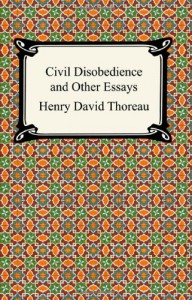

The review below was deleted by Goodreads, along with two others. I received the following message:
In accordance with the hydra principle, I am now reposting it. Maybe Goodreads will indeed retaliate by removing my account. If so, it's been nice knowing you all!Re: [#104307] Deleted Reviews
Goodreads
To Me
Oct 11 at 8:41 PM
Hello Manny,
Your reviews of the following books were recently flagged by Goodreads members as potentially off-topic:
That's Not What I Meant!
Civil Disobedience and Other Essays (Collected Essays)
The Hydra
As the reviews are not about the books in question, they have been removed from the site. You can find the text of the reviews attached for your personal records.
Please note that if you continue to post content like this, your account may come under review for removal.
Sincerely,
The Goodreads Team
__________________________________
Along with thousands of other people here, I am appalled by the recent changes on Goodreads. They prompted me to look at the Terms of Use, something I hadn't done for a long time. I was even more appalled to find that they are so restrictive that I am breaking them all the time. Look in particular at this passage from Article 2:
The clauses I am most surprised by are (v) and (viii). I do not even see how it is possible to follow (v): how can I agree not to post content which "we" (who, exactly?) may deem "profane or otherwise objectionable", when these are entirely subjective criteria? I obviously don't know what some unnamed people in the Goodreads administration may deem objectionable. Clause (viii) is nearly as bad, and means that I am technically in default of the Terms of Use any time I post something that isn't a straight factual review.You agree not to post User Content that: (i) may create a risk of harm, loss, physical or mental injury, emotional distress, death, disability, disfigurement, or physical or mental illness to you, to any other person, or to any animal; (ii) may create a risk of any other loss or damage to any person or property; (iii) seeks to harm or exploit children by exposing them to inappropriate content, asking for personally identifiable details or otherwise; (iv) may constitute or contribute to a crime or tort; (v) contains any information or content that we deem to be unlawful, harmful, abusive, racially or ethnically offensive, defamatory, infringing, invasive of personal privacy or publicity rights, harassing, humiliating to other people (publicly or otherwise), libelous, threatening, profane, or otherwise objectionable; (vi) contains any information or content that is illegal (including, without limitation, the disclosure of insider information under securities law or of another party's trade secrets); or (vii) contains any information or content that you do not have a right to make available under any law or under contractual or fiduciary relationships; or (viii) contains any information or content that you know is not correct and current.
Of course, Goodreads isn't deleting everything that contravenes these absurd rules. But the fact is that if they want to delet something I've written I'll be in a poor position to complain, given that I've clearly been breaking them. I dislike the fact that I've been turned into a criminal who is only allowed to carry on using the service because of the administrators' tolerance and forebearance.
Given that the rules are utterly stupid, it seems to me that the most constructive thing I can do is to follow them. Until they are changed, my policy will thus be to flag anyone who appears to be ignoring Article 2, in particular clauses (v) and (viii). I have for example flagged Paul for his brilliant but non-factual review of The Wind-Up Bird Chronicle:
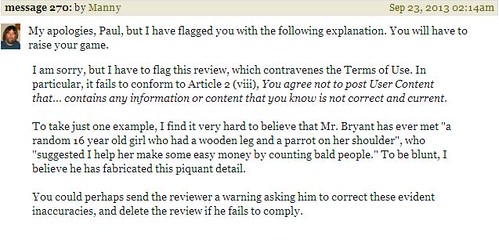
I have similarly flagged Ian for his creative but implausible review of Mein Kampf:

And I have taken particular pleasure in flagging Mark's brief review of An Uncommon Whore (now deleted), which was not just factually incorrect but also insulting:

If you want to start playing this game and aren't sure who to flag, you're more than welcome to start with me. As already noted, I am a serial offender. For example, I freely admit that all of the following reviews contain "information or content that I knew was not correct and current":
My review of Fifty Shades of Grey: there is no such thing as the "Goodreads Center for Bodice-Ripping, Bondage and Twilight Studies".
My review of Quicksilver: I have not been visited by a time-traveler from the 25th century.
My review of The Martian Way: I have never constructed an anti-gravity machine from spare parts bought at a CERN garage sale and used it to fly to Jupiter.
My review of Emmanuelle: Bertrand Russell did not write a book called Principia Sexualis and try to sell the movie rights.
I'm just scraping the surface; there's plenty more.
Happy Flagging!


The review below was deleted by Goodreads, along with two others. I received the following message:
Since several other people have already posted copies, it seems illogical for me not to repost. Maybe Goodreads will indeed retaliate by removing my account. If so, it's been nice knowing you all!Re: [#104307] Deleted Reviews
Goodreads
To Me
Oct 11 at 8:41 PM
Hello Manny,
Your reviews of the following books were recently flagged by Goodreads members as potentially off-topic:
That's Not What I Meant!
Civil Disobedience and Other Essays (Collected Essays)
The Hydra
As the reviews are not about the books in question, they have been removed from the site. You can find the text of the reviews attached for your personal records.
Please note that if you continue to post content like this, your account may come under review for removal.
Sincerely,
The Goodreads Team
__________________________________
In the shower just now, I suddenly had a Eureka moment. The aspect of this current censorship war that's been upsetting us most is the feeling of powerlessless. Goodreads can arbitrarily change the rules, and they hardly even bother to respond when we complain. But we are not powerless. There are twenty million of us, and only a few dozen of them. We just need to get a little more organized, and we can easily resist.
So here's one concrete way to do it, based on the legend of Hercules. You will recall that Hercules had a difficult time against the Lernean Hydra; every time he cut off one of its heads, ten more grew back. We can do the same thing if we adopt the following plan:
1. Back up all your reviews, so that you have a copy of everything you have posted.
2. If you think that one of your reviews has been unreasonably deleted by Goodreads, repost it with an image of the Hydra at the top.
3. If you see someone else posting a Hydra review, make a copy of it and post it yourself.
We can improve this basic scheme with a little thought; for example, it would be better to have a place where we keep HTML marked-up source of reviews, so that they can immediately be reposted with the same formatting, and we need a plan for duplicating deleted shelves. But we can sort that out later. Without getting too bogged down in the details, I'm sure you see what will happen. The net result of Goodreads unreasonably deleting a review will be that it immediately comes back in many different places.
People who know their Greek mythology will be aware that Hercules did in fact defeat the Hydra, and Goodreads can use the same method if they dare; they can close down the account of anyone who participates in the scheme. That will work, but I am not sure that anything less drastic will be effective. I think Goodreads will be reluctant to escalate to this level. A large proportion of the most active reviewers are now part of the protest movement, and they would be losing much of the content that makes the site valuable. Even more to the point, the media have already started to get interested (maybe you saw the article in the Washington Post). They would love the story, and it would create a mountain of bad publicity for Goodreads and Amazon.
I'd say the odds are heavily in our favor. Why don't we try it? I promise now to respond to any Hydra calls.
Non Censure


Reposting a review from Clouds in accordance with the hydra principle:
Hello there,
Your review of Non Censure was recently flagged by Goodreads members as potentially off-topic. As the review is not about the book, it has been removed from the site. You can find the text of the review attached for your personal records.
Additionally, your reviews of the following books were recently brought to our attention:
Moomins Cookbook
Quotations from Chairman Mao Tsetung
All Flesh is Grass
The 5th Wave
The Void
An Uncommon Whore
Unannounced
Logic: A Very Short Introduction
Please note that any reviews you post must contain your own original content (see our review guidelines). Any reviews that are copy-pasted duplicates of other reviews will be removed. Given this, the reviews in question have been deleted. We have attached copies for your personal records.
Please note that if you continue to violate our guidelines, your account may come under review for removal.
Sincerely,
The Goodreads Team
Additionally, your review of The Hydra was also removed.
Sincerely,
The Goodreads Team
------------------
When Goodreads announced their policy change I was annoyed - somewhat because I felt this represented a step towards censorship - but mostly because it was handled in such an unprofessional, cack-handed way.
But we've moved on a step since then. We've moved past the original issue with reviewers attacking authors in their book reviews. Goodreads is now specifically, systematically removing those reviews written in protest of the initial policy change. They are deleting the voice of the opposition.
I have never written a review attacking an author - it's just not my thing, and I wasn't in the firing line - but I was annoyed enough to join the protest movement. And now they've started deleting protest reviews, which puts me and a lot of good, thoughtful reviewers, right in the middle of the censor-sniper's sights. That makes it a lot more personal. That makes me a lot more angry.
I'm now amping up my involvement in the protest movement - this morning I posted 7 Hydra reviews and will be looking at what else I can do when I get home after work (this is my lunch break). They've re-drawn the battle lines, so I'm painting a target on my chest.
I'm a sci-fi reviewer - I've never caused any problems with anyone on this site - it's YOUR actions which have instigated this situation Goodreads - and I'm not leaving until you back down or ban me.
------------------
1.) Posting this protest review resulted in it being deleted.
2.) Reposting will apparently get my account 'put under review for removal'.
3.) I'd like to state for anyone 'reviewing' this that I fully intend to keep reposting every review I hear about that's been deleted - because this censorship policy is WRONG.
4) If the only response to that, you're capable of considering, is removing my account entirely, rather than engaging with your outraged users in meaningful discussion, than just hit the big delete button right now...


I am bemused to discover that some - not even most! - reviews of this book have been deleted under the new Goodreads censorship policy, as far as I can make out because they state that the author is a convicted pedophile. I completely fail to understand the logic of this decision. First, the information that K.P. Bath is a convicted pedophile is so far from being secret that I only have to type "k p bath" into Google to get the following displayed in the second hit:
Second, I had literally never even heard of Bath until Goodreads started deleting reviews. He has now become a widely discussed figure on this site. The only effect of the censorship policy thus appears to have been to publicize further the fact that Bath has been jailed for possessing child pornography.Jul 9, 2010 - PORTLAND, Ore. - A federal judge has sentenced children's author K.P. Bath to six years in prison for possessing child pornography.
Well, in accordance with the Hydra principle, I am adding my own little contribution to underline these obvious points. Feel free to join in.


The following brief review by Mark Monday was removed by Goodreads for breaking their censorship policy, but is reposted here in accordance with the Hydra principle. Let me start by presenting the review itself:
Mark encouraged people to flag his review, and I enjoyed doing so; I pointed out that it violated Article 2 (vii) of the ToU, since it contained incorrect information. An Uncommon Whore, I went on to say, is about someone who gets fucked up the ass for money, and has nothing to do with the acquisition of Goodreads by Amazon. Indeed, Goodreads is not even mentioned.An Uncommon Whore; Or, The Story of Goodreads' Acquisition by Amazon
by Belinda McBride (Goodreads Author)
FLAG
[I am actually quite enthusiastic about reading this one! it looks enjoyable. but I really couldn't resist using the title for my own sordid little joke.]
In case anyone missed it, that was ironic. Mark's review was funny because, at a non-literal and metaphorical level, there are indeed meaningful parallels between the acquisition of Goodreads by Amazon and getting fucked up the ass for money. I can't resist the temptation to elaborate.
The received wisdom, at the moment, is that it is wrong to treat people as sex objects. But, speaking from personal experience, it isn't always bad to be treated as a sex object; it can indeed be very gratifying to feel, briefly, that you are merely a thing that your lover is using to obtain sexual pleasure. Many people enjoy playing this kind of game, and when it is done in an intimate, consensual way I do not see that there is anything wrong with it. The problem is that it shades over into behavior that becomes more and more clearly wrong. The tension between these different ways of looking at the issues are what this book is about.
A couple of other books come to mind here. In Musical Chairs, Jen Knox gives a frank account of what it's like to be a stripper. To my surprise, she says that it is in some ways an empowering experience. The performer, taking her clothes off on stage, has an undeniable power over her audience. But Jen also shows how it is ultimately more degrading than empowering. Even though the audience may show their appreciation by putting ten dollar bills in your G-string, you feel after a while that this is a compliment you would rather not receive. Jen describes how she got out, which was difficult but worthwhile.
A still clearer example is Paul Theroux's underrated novel Doctor Slaughter. Lauren Slaughter is smart, beautiful and insolvent. She is overflowing with self-confidence and unsqueamish about sex, so, when she is offered a job as a high-priced call-girl, she takes it. She is soon making a great deal of money getting fucked, up the ass and elsewhere, by a variety of men. She thinks she can handle it; she feels nothing but contempt for the majority of her clients, she makes friends with a few, she develops a strange, almost loving relationship with one older man who uses her services frequently. But as the book progresses, she comes to understand that she has misjudged the situation. She is not able to keep her feelings outside it. She is just a whore, even if she's an unusually smart and pretty one.
So: what parallels with Goodreads/Amazon? I have worked in a Silicon Valley startup myself, and I know the system from the inside. A group of people with a common dream put something together and hope they'll make money out of it. Sometimes it works. Most often, it comes to nothing. You generally discover after a while that there aren't many options if you want to see a return on your investment. The easiest route is definitely to sell out to one of the multinationals.
If you're approached by a big player, your first reaction is likely to be pleasure and relief. It was possible, indeed likely, that you were going to get nothing, and now you're looking at millions of dollars. Unfortunately, whatever your acquirer may say at first, it usually turns out that their idea of what to do with the startup is rather different from yours. At this point, it often dawns on people, particularly the engineers who did the grunt-work, that they have given up their dream for a financial reward which seems quite insufficient. Comparisons with stripping or prostitution don't appear completely inapposite.
So, in short, I think I was wrong to say that Mark's brief review was factually inaccurate, unless you take an extremely narrow view of what "factually inaccurate" means. In the language of this book, Goodreads has shown itself to be an uncommon whore.
Truly Tasteless Blonde Jokes


Did you hear the one about the blonde Women's World Chess Champion who had to mate with bishop and knight v king?
Doktor Glas
 This book has become quite well-known recently due to the theatre production starring Krister Henriksson. We saw it in London a few months ago, and it is indeed very good; but I was surprised to discover that the book is substantially different.
This book has become quite well-known recently due to the theatre production starring Krister Henriksson. We saw it in London a few months ago, and it is indeed very good; but I was surprised to discover that the book is substantially different. The eponymous Glas, as most people now know, is a doctor in late 19th century Stockholm who kills the husband of one of his patients. Fru Gregorius is young and beautiful; her husband is a hypocritical old priest whose very presence makes Glas feel physically sick. Gregorius's wife is secretly unfaithful to him, and Glas is the only person she has told. She cannot stand the fact that her husband still insists on having sex with her, and asks Glas if he can do anything.
In the play, Glas's motivation seems clear. A lonely person with no one to love, he falls for the beautiful wife's charm and agrees to everything she asks for; he came across as rather like M. Hire in Patrice Leconte's film, though things work out better for him.

But I experienced the book in another way. The central puzzle is why Glas murders the priest. The clear lines of the play are blurred; he is indeed very taken with the wife, but he could equally well have responded to Fröken Mertens, who is also young and beautiful, and clearly loves him. He chooses to ignore her, and there are more factors in play. Glas has always found sex disgusting. The girl he loved as a young man died in a tragic accident shortly after he kissed her for the first time. And so many of his female patients have begged him for abortions. He has consistently turned them down, but he's wondered more and more often if he's been right to do that.
Somehow, sex and death have got mixed up in Glas's cold, analytical mind. The book is the diary he starts keeping as he tries to disentangle things. He scrupulously weighs up the pros and cons of his various choices, discusses the morality of the situation, plans carefully to minimize the chance of being discovered, considers whether he's likely to suffer pangs of remorse. But after he's killed Gregorius, he still doesn't really know why he's done it. He rereads his notes, and decides he probably did the right thing, but he's not sure. All he can see is an infinite web of cause and effect stretching out into the past. He wishes he hadn't investigated it so carefully.
The book, too, has its own web of causes and effects. Several of the characters come from earlier Söderberg novels. The hunchbacked watch-maker who sells Glas the case in which he keeps the cyanide pills also appears in Förvillelser, Söderberg's first book; there, he marries the shop-girl that Thomas Weber gets pregnant. Martin Birck, a character that Glas often meets, is the hero of Martin Bircks Ungdom, written four years earlier, where he is pretty clearly Söderberg himself.
And although people at the time hated Doktor Glas and called it implausible and immoral, it has aged well. The edition I read has a postscript briefly explaining how it was chosen in 2002 to be the first book in the series Stockholm läser - "Stockholm reads". I think Söderberg would have been touched by this gesture of appreciation from the city he loved so much, and I am sure Swedes, and in particular people from Stockholm, will carry on reading it for a long time to come.

 I am distressed by the way that atheism, at least for some people, has managed to metamorphose into just another religion. As far as I am concerned, a blind, dogmatic faith that there is no god is no different from any other kind of blind, dogmatic faith. I respect it, the way I respect all faiths (note that lower-cased 'g' on 'god'), but I had always thought of atheism as being somehow better, and linked to the valuable notion of skepticism. No more, apparently; The Fallacy of Fine-Tuning is an excellent example. I had seen a brief summary of the argument in chapter 5 of Stenger's earlier book God: The Failed Hypothesis, and didn't like it much. Now, he has expanded it to book length. I like it even less in its new form.
I am distressed by the way that atheism, at least for some people, has managed to metamorphose into just another religion. As far as I am concerned, a blind, dogmatic faith that there is no god is no different from any other kind of blind, dogmatic faith. I respect it, the way I respect all faiths (note that lower-cased 'g' on 'god'), but I had always thought of atheism as being somehow better, and linked to the valuable notion of skepticism. No more, apparently; The Fallacy of Fine-Tuning is an excellent example. I had seen a brief summary of the argument in chapter 5 of Stenger's earlier book God: The Failed Hypothesis, and didn't like it much. Now, he has expanded it to book length. I like it even less in its new form. Stenger's presentation is deceptive at several different levels. First, the purpose of the book, as the title suggests, is to dispute the validity of the "fine-tuning argument", the claim that many of the universe's parameters appear to be carefully adjusted to a narrow range which makes life possible. There are, unsurprisingly, a number of people in the Christian apologist/Intelligent Design camp who like the idea, and Stenger goes to some lengths to make it look as though he is primarily arguing against them when he says that a wide range of settings for the universe's parameters would still have made it potentially hospitable to life. He rarely mentions that there are many extremely respectable scientists who are not in any way affiliated to ID, but still think fine-tuning makes good sense. More about that soon.
Second, Stenger includes numerous pages of complicated-looking formulas and graphs. It is evident from glancing at the other reviews here that non-expert readers often have a hard time understanding his math, and are inclined to take it on trust; they naturally assume that Stenger, who has had a distinguished career as a particle physicist, is presenting scientific support for his views in an honest and straightforward way. This is, unfortunately, far from clear.
So, third, and the crux of the matter: just how valid are Stenger's arguments? I am no expert, but I have read a reasonable amount in this area, and I immediately felt very suspicious about some of the points he makes. After just a few minutes of looking around, I found Luke Barnes, a young scientist who's currently working as a postdoctoral researcher at the Sydney Institute for Astronomy. Barnes, who is an expert, posted a long paper on arXiv comprehensively criticizing Stenger's book. A short version was accepted by the Publications of the Astronomical Society of Australia, a reputable peer-reviewed journal.
I am not competent to judge many of Barnes's points just based on my own reading (as noted, he's an expert, I'm not), but some of things he mentions are so flagrant that I am quite sure he is correct. To name two important examples, Stenger says that the enormous difference in strength between the gravitational and electroweak forces is not in need of explanation. As Barnes points out, the "hierarchy problem" is one of the central mysteries of modern physics; it is ridiculous to say that there is nothing to discuss. Even more importantly, Stenger several times dismisses claims from the fine-tuning community on the grounds that they are explained by the mechanism of inflation in the early universe. It is well-known that inflation needs to be very finely tuned (probably to ten or eleven decimal places) in order to explain the observed data. Stenger nowhere mentions this critical point, which he is surely aware of.
In his blog, Barnes is articulate and funny when explaining what's wrong with Stenger. I particularly recommend his post from May 2 2012, "In Defence of The Fine-Tuning of the Universe for Intelligent Life", where he rebuts Stenger's response to his critical paper. Here is the concluding passage:
Large red letters on Stenger's homepage inform us that "No reputable physicist or cosmologist has disputed this book". I guess that makes me a disreputable cosmologist. In the meantime, a shortened version of my paper has been accepted for publication by Publications of the Astronomical Society of Australia. The fate of Stenger's paper 'A Case Against the Fine-Tuning of the Cosmos', submitted to the "Journal of Cosmology", is unknown.
In any case, if you'd rather decide this issue by a show of hands rather than good arguments, then let's play pick the odd one out of these non-theist scientists.
Wilczek: life appears to depend upon delicate coincidences that we have not been able to explain. The broad outlines of that situation have been apparent for many decades. When less was known, it seemed reasonable to hope that better understanding of symmetry and dynamics would clear things up. Now that hope seems much less reasonable. The happy coincidences between life's requirements and nature's choices of parameter values might be just a series of flukes, but one could be forgiven for beginning to suspect that something deeper is at work.
Hawking: "Most of the fundamental constants in our theories appear fine-tuned in the sense that if they were altered by only modest amounts, the universe would be qualitatively different, and in many cases unsuitable for the development of life. ... The emergence of the complex structures capable of supporting intelligent observers seems to be very fragile. The laws of nature form a system that is extremely fine-tuned, and very little in physical law can be altered without destroying the possibility of the development of life as we know it."
Rees: Any universe hospitable to life -- what we might call a biophilic universe -- has to be 'adjusted' in a particular way. The prerequisites for any life of the kind we know about -- long-lived stable stars, stable atoms such as carbon, oxygen and silicon, able to combine into complex molecules, etc -- are sensitive to the physical laws and to the size, expansion rate and contents of the universe. Indeed, even for the most open-minded science fiction writer, 'life' or 'intelligence' requires the emergence of some generic complex structures: it can't exist in a homogeneous universe, not in a universe containing only a few dozen particles. Many recipes would lead to stillborn universes with no atoms, no chemistry, and no planets; or to universes too short-lived or too empty to allow anything to evolve beyond sterile uniformity.
Linde: the existence of an amazingly strong correlation between our own properties and the values of many parameters of our world, such as the masses and charges of electron and proton, the value of the gravitational constant, the amplitude of spontaneous symmetry breaking in the electroweak theory, the value of the vacuum energy, and the dimensionality of our world, is an experimental fact requiring an explanation.
Susskind: The Laws of Physics ... are almost always deadly. In a sense the laws of nature are like East Coast weather: tremendously variable, almost always awful, but on rare occasions, perfectly lovely. ... [O]ur own universe is an extraordinary place that appears to be fantastically well designed for our own existence. This specialness is not something that we can attribute to lucky accidents, which is far too unlikely. The apparent coincidences cry out for an explanation.
Guth: in the multiverse, life will evolve only in very rare regions where the local laws of physics just happen to have the properties needed for life, giving a simple explanation for why the observed universe appears to have just the right properties for the evolution of life. The incredibly small value of the cosmological constant is a telling example of a feature that seems to be needed for life, but for which an explanation from fundamental physics is painfully lacking.
Smolin: Our universe is much more complex than most universes with the same laws but different values of the parameters of those laws. In particular, it has a complex astrophysics, including galaxies and long lived stars, and a complex chemistry, including carbon chemistry. These necessary conditions for life are present in our universe as a consequence of the complexity which is made possible by the special values of the parameters.
Guess who?: The most commonly cited examples of apparent fine-tuning can be readily explained by the application of a little well-established physics and cosmology. ... [S]ome form of life would have occurred in most universes that could be described by the same physical models as ours, with parameters whose ranges varied over ranges consistent with those models. ... . My case against fine-tuning will not rely on speculations beyond well-established physics nor on the existence of multiple universes.
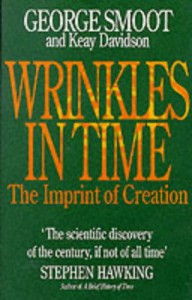 I am warned that I should take this book with a pinch of salt, since Smoot may not be telling us the whole truth and nothing but the truth. But dammit, I want to believe him. This is what science should be like: go out and look for the data, no matter what it costs you. At several points, you just can't help comparing him with Indiana Jones.
I am warned that I should take this book with a pinch of salt, since Smoot may not be telling us the whole truth and nothing but the truth. But dammit, I want to believe him. This is what science should be like: go out and look for the data, no matter what it costs you. At several points, you just can't help comparing him with Indiana Jones.Smoot started off in the early 70s as a particle physicist, where the norm was already for people to work together in big teams. But he was ambitious, and thought he'd never get anywhere as an anonymous member of a giant collaboration. He looked around and got interested in observational cosmology, which was finally starting to take off. In particular, he was greatly influenced by Peebles's book on the subject. People had just found the Cosmic Microwave Background Radiation - the faint radiation coming from all over the sky that was generally assumed to come from the Big Bang - but no one knew much about it. Peebles urged researchers to find out more.
Smoot started doing cosmology, though he didn't immediately get involved with the CMBR. His first project was an attempt to detect antimatter atoms in cosmic rays, which at the time was another hot topic: some people thought there was a lot of antimatter out there just waiting to be discovered. Maybe there were antimatter suns with antimatter planets orbiting them. (This is for example the premise of Jack Williamson's SF novel Seetee Ship). Now, it's hard to remember that it was ever more than science-fiction, but then it was taken seriously.
Smoot set out to look for antimatter in cosmic rays, flying experiments in balloons to get them high enough to have a chance of catching something. There were all sorts of exotic accidents. One balloon crashes on a farm in the Badlands, and they have to retrieve the tapes from the wreckage. At the end, they have tens of thousands of events recorded, and they analyze them all to try and figure out if they've found any antimatter. They can explain every event as normal, with one single exception; as far as they can see, it's possible that it's antimatter. But the odds are only three to one in their favor, so they decide to run a bunch more balloon experiments. They never find another possible antimatter event - so it's a negative result, but an interesting one which more or less refutes the idea that there are antimatter stars.
As you can see, Smoot is a careful guy who knows how to get things done. He then starts a new project which finally does get to looking at the CMBR; he wants to use it to establish a universal frame of reference, so that he can measure the absolute velocity of the Earth. Everyone tells him this can't be done, since it means measuring temperature differences in the CMBR of around a thousandth of a degree, and there is no way to fly the experiment. But Smoot has heard that old U-2 spy planes are possibly being made available for scientific research purposes, he works his connections, he persuades people to do the incredibly tricky engineering, and he gets data which indicates that the Earth's velocity (indeed, our galaxy's velocity) is far greater than it should be, which has many interesting consequences for cosmology. Unfortunately, skeptics argue that it could be a false signal, and the only way to find out is to redo the experiment in the Southern Hemisphere. He somehow ships everything down to Peru, bribes and wheedles his way into getting approval, and collects his data. It turns out that the signal is genuine.
I haven't even got to the COBE satellite mission, the high point of the book, but you get the picture. In a way, I don't care if Smoot is stretching the truth or exaggerating his role. I think people like him are essential when you have a new field that's just opening up; another example that springs to mind is Galileo, clearly one of his heroes. Smoot advanced the state of our understanding of the universe a great deal by being willing to do whatever it took to find answers to questions that many people thought were too difficult to investigate. He learned tricky theoretical ideas and turned them into concrete experiments, he put together crack teams of engineers and forced them to build devices with ridiculous levels of robustness and accuracy, he sat in budget meetings and persuaded people who didn't like him to give him money, and when necessary he went in person to the Amazon jungle or the South Pole to get the observations he needed.
And all the time, he was careful never to believe he'd found something when it was possible that all he had was wishful thinking. He tried his damnedest to eliminate uncertainties, and at one point towards the end of the COBE project he offered a substantial reward to any member of the team who could show why the current results were not correct. Maybe he wasn't 100% honest, but neither was Galileo. For my money, Smoot will go down in history as another truly first-rate experimental scientist.
XVII Chess Olympiad, Havana 1966: 364 Games from the Top Final Section
 Last Sunday, I had the privilege of playing a serious game of chess against Florin Gheorghiu, who celebrated the proudest moment of his career at the 1966 Havana Olympiad (World Chess Team Championship) when he was just 22. In the last round, Romania was paired against the US, and Gheorghiu faced the already legendary Bobby Fischer. Fischer was chasing the gold medal for best individual performance and was neck-and-neck with the current World Champion, Tigran Petrosian. So, when Gheorghiu offered an early draw, Fischer declined, despite being Black and standing slightly worse. He had been having a fantastic tournament and was confident that he could turn it round. But Gheorghiu rose to the occasion and won the game. According to several people present, Fischer was so upset by the result that he cried. (These temperamental geniuses, you know...) On top of everything else, it was the only time he had ever lost to a player younger than himself, and he never did it again.
Last Sunday, I had the privilege of playing a serious game of chess against Florin Gheorghiu, who celebrated the proudest moment of his career at the 1966 Havana Olympiad (World Chess Team Championship) when he was just 22. In the last round, Romania was paired against the US, and Gheorghiu faced the already legendary Bobby Fischer. Fischer was chasing the gold medal for best individual performance and was neck-and-neck with the current World Champion, Tigran Petrosian. So, when Gheorghiu offered an early draw, Fischer declined, despite being Black and standing slightly worse. He had been having a fantastic tournament and was confident that he could turn it round. But Gheorghiu rose to the occasion and won the game. According to several people present, Fischer was so upset by the result that he cried. (These temperamental geniuses, you know...) On top of everything else, it was the only time he had ever lost to a player younger than himself, and he never did it again.I played Gheorghiu 47 years after his encounter with Fischer, and less was at stake: after a dreadful season, we are forlornly hoping not to get relegated from the B division of the Swiss National League. All the same, I should have prepared much more carefully for my game, since I knew I was quite likely to be drawn against him. In the event, I spent a large part of the preceding week posting about censorship on Goodreads, and didn't even look at a chessboard. Not, who acts as my second, was scathing about my unprofessional approach. And indeed, things did not go well...
CAEG - Echallens, Sep 29 2013
FM Manny Rayner - IGM Florin Gheorghiu
1. Nf3 c5
2. c4 g6
3. d4 Bg7
4. e4 Qa5+!?

What on earth was this move? I vaguely remembered having seen it, but couldn't remember if it was supposed to be any good. Grandmasters playing Black against a weaker opponent often pick an unsound, offbeat line in the hope of confusing them; in that case, it's important to be resolute and not wimp out. I thought for nearly 20 minutes and decided to sacrifice a pawn. He wasn't going to scare me!
5. Nc3 Nc6
6. dc? Bc3+!
7. bc Nf6!

Oh shit. I had only considered Qc3+, after which I have quite a lot of compensation, and had completely missed this natural reply. I realized to my horror that I had an almost lost position as White after seven moves. I looked around for some way to limit the damage.
8. Qc2! Ne4!
I can't take the knight, because then Qc3+ wins. But I had already prepared the next two moves:
9. Bd3! Nc5
10. OO!
I've lost a pawn, but at least I'm ahead in development.
10... d6
11. Nd4!
He is clearly much better, but he still needs to choose how to exploit his advantage. The alternative he chose looked like one of the less dangerous ones.
11... Be6?!
12. Ne6 fe
13. Be2

For a moment, I felt almost happy. I have the bishop pair and some attacking chances. If I just have time to play Be3 and Qd2, things won't be too bad. But Gheorghiu had a long think and found a very strong move.
13... Qa4!
If I exchange the queens, I have a lousy ending which is almost certainly hopeless. Of course I keep them on, but he forces my queen somewhere it doesn't want to go.
14. Qb2 Ne5!
He keeps up the pressure and threatens to win the c4 pawn. I thought for a moment that I could play Qb4. If he exchanges the queens himself, my pawns get straightened out and I'm more or less okay. But instead he plays ... a5! and then I couldn't see what to do. In the end, I decided to seek my chances in a heavy piece middlegame.
15. Be3 Nc4
16. Bc4 Qc4
17. Bc5 Qc5
18. Qb7 Kf7!
19. Qf3+ Qf5!
20. Qg3
I had hoped I'd be able to exploit the slightly loose position of his king, but he finds all the best moves and reminds me that he used to be in the world's top 20.
20... Rac8
21. Rae1 Rc4!
22. Re3 Rf4!

Blocks the rather pathetic threat of Rf3. Now my position looks more or less lost again.
23. f3 Rc8
24. Rae1 e5
25. Qf2 Rfc4
My c-pawn is feeling horribly uncomfortable.
26. Qd2 Kg7
27. g3
I have a dream of playing f4 and opening up the center for my rooks, but Gheorghiu contemptuously brushes aside my feeble threats.
27... R8c5
28. Kg2
On top of everything else, I'm short of time on the clock.
28... Qc8!

A veritable textbook example of how to increase your advantage. Having tidied his king away, he forces my rook to a passive square and prepares the final assault.
29. Rc1 Qc6
30. Rc2 e4!
He methodically exchanges off his doubled pawn, also reminding my king that it's far from safe on g2.
31. Qe2
Black's got any number of ways to wrap it up. He picks the safest one, exchanging off to a winning rook ending.
31... ef+
32. Qf3 Qf3+
33. Kf3 Kf7

He's got all the time in the world to get things ready.
34. Ke2
At least I centralize my king and try to help my miserable c-pawn. It can't hurt.
34... d5
35. Kd3 Ke8
Now he's just going to shuffle his king to d7, and then d6, play e5 and d4, and that will be it. There's nothing I can do.
Or is there? To my great surprise, I saw that I'd been given a chance. I had to take it right now.

36. Re6!
The rook jumps to the weak square left by Black's last move. Now if he plays ... Kd7, I move my other rook to the e-file, threatening his e-pawn, and it's no longer clear what's going on. My rooks are suddenly alive again. He thought a bit and decided to push his d-pawn immediately.
36... d4
37. R2e2!
If he plays ... dc, I have time to take his e-pawn with check before blockading his pawn with my king - and again, who knows what's happening? He decides to keep a safe extra pawn.
37... Rc3+
38. Kd4
I was very happy to kill this ambitious foot-soldier.
38... R5c4+
39. Kd5 Rc7
40. Kd4 Rc1
I had made the time control, and my position looked better than it had since the early opening. I instinctively felt that I could hold this. Things have swung around 180 degrees: now he's the passive one. But I needed to play very accurately. After a long think, I retreated my king again.
41. Kd3 Rd1+?!
I was pleased to have him force my king back to safety on the king-side. It was feeling unhappy in the center, and maybe he missed a chance somewhere around here.
42. Ke3 Rd5
43. Kf2 Ra5
44. Kg2 Kf7

I could see the trick he was planning, and after another long think I let him do it. As it turned out, I had now more or less calculated to the end of the game, but I wasn't sure I'd got it right. My uncertainty was justified; I had missed a couple of finesses, but luckily they didn't matter. The important thing is that this kind of ending is structurally almost impossible to win for Black, for reasons that "every Russian schoolboy knows".
45. h4 Ra2
46. Re7+ Re7
47. Ra2 Ke6
He just can't activate his rook. My rook is in front of the potentially dangerous a-pawn: not ideal in general, but good here when it's so far back. He does the only thing he can, running his king over to support the pawn.
48. Kf3 Kd5
49. Kf4 Kc4
50. Ra1
I want to be as far back as possible so that I can check his king and force it to a bad square.
50 ... Kb3
51. Rb1+ Ka2
52. Rb5 Ka3

Now his king is stuck on the a-file in front of his pawn. I'm going to leave it there and get on with the next part of my plan, advancing the king-side pawns.
53. g4 Ka4
54. Rb8 a5
55. h5 gh
56. gh Re6!
He is alert and gives me as many chances as possible to go wrong.
57. Kf5 Rc6
My king is cut off from his h-pawn, but he can't keep it cut off if he wants to make progress.
58. Rb7 h6
59. Rb8 Ka3
60. Rb7 a4
61. Rb8 Ka2
62. Rb7 a3
63. Rb8 Ka1
64. Rb7 a2

All I've been able to do was wait while he laboriously trundled his pawn down the board, but I was almost sure that waiting would be enough. He can't untangle himself.
65. Rb8 Rc2
This is the only thing he can try to get his king out of the box. Now I have just enough time to take his h-pawn.
66. Rb6!
When thinking about this position about 10 moves earlier, I had been planning Kg6?? here, which would have been a catastrophic blunder. Luckily, I spotted it a few moves later, and by the time we actually got there I knew what to do.
66 ... Rb2
67. Rh6
I take his h-pawn, and now I have a passed pawn too. He's getting a queen first, but then his king is too far away to stop me getting one of my own.
67 ... Rb5+
68. Kg4 Kb1
69. Ra6 a1=Q
70. Ra1+ Ka1

His king is as badly placed as can be, and my pawn serenely moves up the board, supported by my king.
71. h6 Kb2
72. h7 Rb8
73. Kg5 Kc3
74. Kg6 Kd4
75. Kg7 Ke5
76. h8=Q Rh8
77. Kh8
Draw.

He evidently didn't want to offer me a draw, it was too annoying.
I felt kind of bad for him, considering that he'd completely outplayed me, but also proud of finding my saving chance and managing to exploit it. This is the kind of game that can make you think chess is a worthwhile thing to do.
القرآن الكريم
 The more I think about the current Goodreads policy on "author behavior", the more bemused I feel. At first, I was reluctant to believe that Goodreads could actually be following advice from StGRB, a notorious crank site. It seemed too much like a conspiracy theory. But the picture emerging on Ceridwen's Tumblr does rather seem to be pointing in that direction.
The more I think about the current Goodreads policy on "author behavior", the more bemused I feel. At first, I was reluctant to believe that Goodreads could actually be following advice from StGRB, a notorious crank site. It seemed too much like a conspiracy theory. But the picture emerging on Ceridwen's Tumblr does rather seem to be pointing in that direction.If Goodreads really intends to delete reviews commenting on author behavior, which is what they say, they have chosen an odd selection for their initial batch. Why haven't they clamped down on Quran reviews, which often upset the many devout Muslims who post here? I considered removing my own review, but most of the Muslims on the comment thread have assured me that, despite their religious beliefs, they found it very amusing; indeed, I am satirizing atheism far more than Islam.
Other reviews, however, are in a different category. For example, Rita's review cites chapter and verse to argue that the Prophet (PBUH) was a pedophile. Although Islamic tradition maintains that the marriage of Mohammed (PBUH) with his twelfth and final wife 'Aisha was consumated when she was nine years old, Muslims emphatically do not view the matter in the way Rita presents it. It is clear that many people have been very distressed indeed by the review. Yet somehow it has been allowed to stand. I suppose one can argue that Mohammed (PBUH) is technically not the author of the Quran, and hence that there is no problem, but it seems a little risky to me.
Frankly, I don't get it. Surely the feelings of a few obscure self-published authors can't be more important than those of the site's hundreds of thousands of Muslim members? I'm curious to see what happens next. Meanwhile, I have just backed up my own Quran review to be on the safe side.
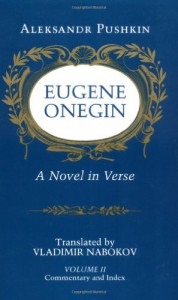 In response to Geoff's recent review of Part I:
In response to Geoff's recent review of Part I:Oddly enough, my amazing girlfriend cross-examined me about how often I actually read Nabokov's translation of Onegin, the spine of which was suspiciously uncreased. On hearing my feeble answers, she put both volumes in the "To be donated" pile. And she's a keeper too.My amazing girlfriend gave me both volumes of Nabokov's translation of Onegin for xmas. She's a keeper.
Moral: what we booknerds are looking for is someone who cares enough about Nabokov's translation of Onegin to have a strong opinion on the subject.
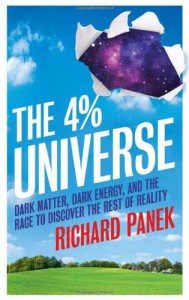 What a very strange book this is, and what a very strange guy Richard Panek seems to be. I know many autistic-spectrum people, and I wonder if he isn't a little autistic. One of the most characteristic things about autistic people is the unevenness in their range of abilities. They are usually extremely good at some things and staggeringly incompetent at others. Panek is definitely a bit in that direction.
What a very strange book this is, and what a very strange guy Richard Panek seems to be. I know many autistic-spectrum people, and I wonder if he isn't a little autistic. One of the most characteristic things about autistic people is the unevenness in their range of abilities. They are usually extremely good at some things and staggeringly incompetent at others. Panek is definitely a bit in that direction.Panek sets out to tell us about the most recent chapters in the exciting history of cosmology, the discovery of dark matter and dark energy. As everyone now knows, most of the universe is invisible. The 4% in the title is the part we can see: planets, stars, nebulae, things like that. Then there's about another 25% which is dark matter - we can't see it, but we can quite easily see the gravitational effects it causes - and the rest is dark energy, the evidence for which is considerably more indirect. The greater part of the book is about the discovery of dark energy during the 90s. Its presence is detectable by the fact that it acts to stretch the universe apart over time (you sometimes see it called "anti-gravity"), and finding proof that the stretching existed was very difficult. It involved accurately measuring the distances to galaxies which are many billions of light years away, obviously a challenging thing to do.
But scientists can be ingenious when there is a good reason for displaying ingenuity. The brightest things there are (simplifying a little) are the huge stellar explosions called supernovae, and it turns out that a certain type of supernova has predictable enough behavior that it can be used to carry out the accurate measurements that were needed. A supernova is so bright that you're able to see it more or less literally from the other end of the universe, and because their behavior is well understood you can also figure out from careful examination of the rate of change of intensity what their true brightness is. Comparing the true and apparent brightness gives you their distance. But the details are complicated.
So why are Panek and the book strange? Well, let me start with the good news. He is an incredibly dogged and hardworking journalist. He seems to have talked with virtually everyone who was involved in the story, he has read their papers, he has looked at their emails and PowerPoint slides, and he is certainly able to present you with some rather striking details. Where Vera Rubin was standing when she received a critical phone call; Alan Sandage's loss of his sense of balance causing him problems on the high telescope platform towards the end of his career; how the cosmology community reacted when they heard that David Schramm's private plane had crashed. He's got all the gossip, and, given that the discovery of dark energy was an acrimonious race between two teams, there's plenty to write about. On all of this, I can't fault him. He's booked you a ringside seat, and you can see the drops of blood flying every time someone lands a solid punch.
Now for the middling news. Panek, alas, is not a particularly gifted writer. His prose is cliché-ridden and pedestrian. He is not good at sketching character. There are a bewildering number of people in the story, and it's frequently impossible to tell them apart. A lot of the time, you just have to remember that X is the person who's responsible for Y on the blue team, and Z is the person responsible for W on the red team. Luckily, a few people are such appalling assholes that their personalities shine through. (I hasten to add that there are also some truly admirable characters; the one I liked best was Vera Rubin). But they're the exceptions.
And finally for the bad. Oddly enough, for someone who's an award-winning science journalist, Panek seems to be rather sketchy on science. There are some remarkable bloopers. He says that the Casimir effect integrally involves gravity. He tells us that the hypothetical neutralino (important to dark matter theorists) is the supersymmetric partner of the neutrino. Most astonishingly of all, he misquotes Kepler's Third Law - something your average scientist learns in their early teens - and even gives some incorrect examples of how to apply it. So, unfortunately, when he's explaining something I don't already know, I'm never sure whether to trust him. I doubt I've spotted all the glitches.
To summarize, then, a mixed bag. But despite the weaknesses, I give him a clear thumbs-up. He's got an incredible story to tell you about how science actually gets done.
 Why I Refuse to Read David Irving
Why I Refuse to Read David IrvingOver the last few days, there have been extensive protests concerning the new Goodreads policy, which is widely interpreted to mean that people who post reviews criticizing authors are liable to have them deleted. The most visible of these protests is Mike's review of Mein Kampf, where Mike calls Adolf Hitler a dick and says he refuses to read his book. The review has already attracted more than 300 votes and 150 comments.
We all know that Hitler was a monster and that Mein Kampf is one of the most hateful and dangerous books ever written. Mike's warning is funny because it is so obviously superfluous. But there are other cases where the truth is not quite as generally known, and this is one of them. David Irving was famously found guilty of being a Holocaust denier in a high-profile trial which bankrupted him. He was later sentenced to three years in prison by an Austrian court on charges of "trivialising, grossly playing down and denying the Holocaust". If you look at the Wikipedia article on Irving, you will find the following quote from Christopher Browning, a historian who is an expert on the Holocaust:
The same article contains interesting material about this book, The Destruction of Dresden, which was written before Irving's views on the Holocaust became widely known and became a bestseller. Again, I quote:Not one of [Irving's] books, speeches or articles, not one paragraph, not one sentence in any of them, can be taken on trust as an accurate representation of its historical subject. All of them are completely worthless as history, because Irving cannot be trusted anywhere, in any of them, to give a reliable account of what he is talking or writing about. ... if we mean by historian someone who is concerned to discover the truth about the past, and to give as accurate a representation of it as possible, then Irving is not a historian.
Yet looking at the five reviews here on Goodreads, I see that four of them uncritically accept Irving's account and praise the book.In the first edition, Irving's estimates for deaths in Dresden were between 100,000 and 250,000 -- notably higher than most previously published figures. These figures became authoritative and widely accepted in many standard reference works. In later editions of the book over the next three decades, he gradually adjusted the figure downwards to 50,000-100,000. According to the evidence introduced by Richard J. Evans at the libel trial of Deborah Lipstadt in 2000, Irving based his estimates of the dead of Dresden on the word of one individual who provided no supporting documentation, used forged documents, and described one witness who was a urologist as Dresden's Deputy Chief Medical Officer. The doctor has since complained about being misidentified by Irving, and further, was only reporting rumours about the death toll. Today, casualties at Dresden are estimated as 22,700-25,000 dead.
If I were willing to spend several months or years of my life on the task, I could do my own digging around and try to come to an independent conclusion. I am unlikely to do this; it seems to me, just on the basis of the few articles I have read, that the facts are pretty clear. Irving has been repeatedly unmasked as a Nazi sympathizer and a serial liar. He has tried to defend himself against these charges in court, and he has failed miserably. Yet, somehow, people are not as aware of his true nature as they should be.
I do not see anything unethical about posting this negative review of Irving, and it may conceivably have some value in making unsuspecting people more critical of his book. I am concerned about Goodreads policies which may lead to reviews of this kind being deleted without warning. They strike me as utterly wrong, and moreover as yet another example of how modern technology distances us from the consequences of our actions. If people wrote their reviews on paper and put them into a real, physical library, I am sure that the Goodreads administrators would be very reluctant to pull them down from shelves and burn them. When you can get rid of a piece of writing just by clicking on a few links, there's a temptation to believe that it's less serious. But it isn't. It's just less clear what you've done.
I am absolutely against book-burning in all its forms. I do not want David Irving's books burned, or even Mein Kampf. But I do want people to know that the authors of these books are racist liars, and I, at least, refuse to read them.
_____________________________________
I would appreciate it if AS MANY PEOPLE AS POSSIBLE flagged this review, which is a crystal-clear violation of the Terms of Use. More background here.


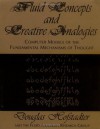








 1
1
 12
12
 3
3
